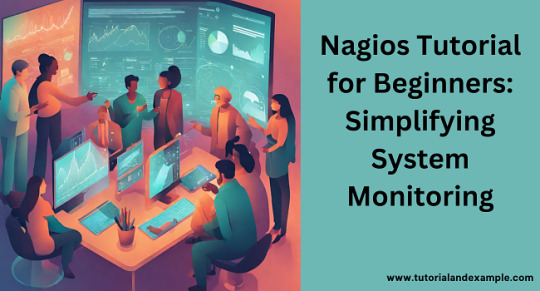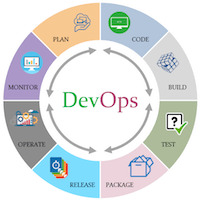#Nagios Tutorial
Explore tagged Tumblr posts
Text
From Zero to Hero: A Beginner's Journey into Nagios Monitoring

Are you new to system monitoring and looking to understand how to keep your IT infrastructure running smoothly? Nagios, a powerful tool, can help you achieve just that. This beginner's tutorial will guide you through the basics of setting up and using Nagios effectively.
What is Nagios?
Nagios is an open-source software application that monitors systems, networks, and infrastructure components. It provides insights into the health and performance of your IT environment by continuously checking specified parameters.
Getting Started
Installation: Begin by installing Nagios on your server. Follow the installation instructions for your operating system, ensuring all prerequisites are met.
Configuration: After installation, configure Nagios to monitor your devices and services. This involves defining hosts (servers, routers, switches) and services (CPU usage, disk space, HTTP response).
Monitoring: Once configured, Nagios will start monitoring your infrastructure. It will alert you when issues arise, such as high CPU usage or a server outage, helping you address problems proactively.
Tips for Effective Monitoring
Regular Checks: Set up regular checks to monitor critical aspects of your infrastructure.
Alerting: Configure alert notifications to promptly respond to issues.
Dashboard: Use Nagios' dashboard to visualize data and trends for better decision-making.
Conclusion
By mastering Nagios basics, you can ensure your IT systems operate smoothly and minimize downtime. Ready to get started? Check out this Nagios tutorial for beginners for detailed steps and examples.
Learning to monitor effectively with Nagios is a valuable skill that enhances IT operations and keeps your business running smoothly.
0 notes
Text

Discover the basics of Nagios with our beginner-friendly tutorial. Learn how to set up, configure, and effectively monitor your IT infrastructure to ensure optimal performance and uptime.
0 notes
Link

#Nagios#Nagios Core#Start#Stop#Restart#How to start Nagios core#How to stop Nagios Core#Nagios Guide#Nagios Tutorial#DevOps#DevOps Tool#scmGalaxy
9 notes
·
View notes
Link

#Nagios#Nagios Core#Start#Stop#Restart#How to start Nagios core#How to stop Nagios Core#Nagios Guide#Nagios Tutorial#DevOps#DevOps Tool#scmGalaxy
0 notes
Link

#Nagios#Nagios Core#Start#Stop#Restart#How to start Nagios core#How to stop Nagios Core#Nagios Guide#Nagios Tutorial#DevOps#DevOps Tool#scmGalaxy
0 notes
Link

#Nagios#Nagios Core#Start#Stop#Restart#How to start Nagios core#How to stop Nagios Core#Nagios Guide#Nagios Tutorial#DevOps#DevOps Tool#scmGalaxy
0 notes
Text
DevOps Tutorial for Beginners: A Comprehensive Guide
DevOps is a modern approach to software development that emphasizes collaboration, communication, and integration between development and operations teams. This approach helps teams deliver software faster and with greater reliability. And to learn all the in-demand skills, you need to enroll yourself for the DevOps courses in India.
What is DevOps?
DevOps is a software development methodology that combines software development (Dev) and IT operations (Ops). The goal is to automate the entire software development lifecycle, from code development to deployment, testing, and maintenance. This approach helps organizations to achieve faster software delivery, improved quality, and better collaboration between teams.
DevOps Tutorial: How to Get Started
Start with the basics: Understanding DevOps
The first step in learning DevOps courses in India is to understand its key principles and components. The basic components of devops certification training include continuous integration, continuous delivery, and continuous deployment. These components are designed to streamline the software development process by enabling teams to build, test, and deploy software quickly and reliably.
Learn about DevOps tools and technologies in the DevOps courses in India
DevOps relies heavily on automation and the use of tools and technologies. Some of the most popular DevOps tools taught under DevOps Certification Course include:
Configuration management tools (such as Ansible, Puppet, and Chef)
Continuous integration tools (such as Jenkins, Travis CI, and GitLab CI/CD)
Continuous deployment tools (such as Kubernetes and Docker)
Monitoring tools (such as Nagios, Zabbix, and Prometheus)
Develop skills in programming and scripting with the help of DevOps courses in India
To work in DevOps, it's important to have a good understanding of programming and scripting. Some of the most popular programming languages used in DevOps include Python, Java, and Ruby. It's also important to have a good understanding of scripting languages like Bash, Perl, and PowerShell. All the programming skills are covered under DevOps online training.
Build your DevOps team
DevOps requires collaboration between development and operations teams. To build a successful DevOps team, you need to find people with the right skills and expertise. Look for team members with experience in programming, automation, system administration, and cloud computing as well as appearing for DevOps course online.
Set up your DevOps infrastructure
Once you have your team in place, you need to set up your DevOps infrastructure. This involves creating a development environment, testing environment, and production environment. You'll also need to set up tools for version control, continuous integration, continuous delivery, and monitoring. All the infrastructural setup is briefly discussed under DevOps training.
Use agile methodology
Agile methodology is an iterative approach to software development that emphasizes collaboration and flexibility. Using agile methodology as taught in the DevOps courses in India can help teams deliver software faster and with greater reliability. Some of the key components of agile methodology include sprints, user stories, and retrospectives.
Implement DevOps best practices
To achieve the best results from DevOps, it's important to follow best practices outlined in the DevOps courses in India. Some of the best practices for DevOps include:
Automate everything possible
Use a version control system
Monitor everything
Continuously improve
In this DevOps tutorial for beginners, we covered the basics of DevOps and provided a comprehensive guide to get started. DevOps is a powerful methodology that can help organizations deliver software faster and with greater reliability. To get started with DevOps, you need to understand its key principles and components, learn about the tools and technologies, develop your programming and scripting skills, build your DevOps team, set up your infrastructure, use agile methodology, and implement DevOps best practices. Plus, you need to enroll for the DevOps courses in India. With these steps in mind, you can get started on your journey towards DevOps excellence. Level up your career with the DevOps certification course. ClouThat offers a wide array of Devops online courses. Learn from the CloudThat experts and build your future.
0 notes
Link

#Nagios#Nagios XI#Nagios XI Server#Start#Stop#Restart#How to start Nagios XI Server#How to stop Nagios XI Server#Nagios Server Guide#Nagios Server Tutorial#DevOps#DevOps Tool#scmGalaxy
9 notes
·
View notes
Text
DevOps Tutorial | A Step-by-Step Guide For Beginners
DevOps Tutorial

The DevOps is the combination of two words, one is Development and other is Operations. It is a culture to promote the development and operation process collectively.
The DevOps tutorial will help you to learn DevOps basics and provide depth knowledge of various DevOps tools such as Git, Ansible, Docker, Puppet, Jenkins, Chef, Nagios, and Kubernetes.
What is DevOps?
DevOps is a combination of two words, one is Software Development, and the second is Operations. This allows a single team to handle the entire application lifecycle, from development to testing, deployment, and operations. DevOps helps you to reduce the disconnection between software developers, quality assurance (QA) engineers, and system administrators.
Why DevOps?
Before going further, we need to understand why we need DevOps over the other methods.
The operation and development team worked in complete isolation.
After the design-build, the testing and deployment are performed respectively. That's why they consumed more time than actual build cycles.
Without the use of DevOps, the team members are spending a large amount of time on designing, testing, and deploying instead of building the project.
Manual code deployment leads to human errors in production.
Coding and operation teams have their separate timelines and are not in synch, causing further delays.
DevOps History
In 2009, the first conference named DevOpsdays was held in Ghent Belgium. Belgian consultant and Patrick Debois founded the conference.
In 2012, the state of DevOps report was launched and conceived by Alanna Brown at Puppet.
In 2014, the annual State of DevOps report was published by Nicole Forsgren, Jez Humble, Gene Kim, and others. They found DevOps adoption was accelerating in 2014 also.
In 2015, Nicole Forsgren, Gene Kim, and Jez Humble founded DORA (DevOps Research and Assignment).
In 2017, Nicole Forsgren, Gene Kim, and Jez Humble published "Accelerate: Building and Scaling High Performing Technology Organizations".
For More Information Visit: DevOps Tutorial
0 notes
Text
Are you learning DevOps? Then this video is perfect for you to dig deep into DevOps Nagios Monitoring Tool Tutorial. Click here to get started: https://bit.ly/3v0vvPB
0 notes
Text
Open source network bandwidth monitoring tool

#Open source network bandwidth monitoring tool how to#
#Open source network bandwidth monitoring tool software#
#Open source network bandwidth monitoring tool free#
This comprises the capability to create custom scripts for data gathering along with the facility for SNMP polling. The tool utilizes data gathering functionality and network polling to collect information on various devices on networks of any scope. CactiĬacti is an open-source network monitoring tool built on RRD Tool’s data classification and plotting system. There exist a few Icinga modules for very specific monitoring capabilities, like monitoring for VMWare’s vSphere cloud environment and business process modeling. The tool is scalable and easily configurable to function with each type of device. Through a web interface, your business can observe applications and hosts around your complete network infrastructure. Icinga is an open-source network monitoring tool that calculates the availability and performance of the network. It supports all the popular Operating Systems like Windows, Linux, etc. Its monitoring does not require a separate workflow. By means of a single platform, you can monitor services, applications, servers, and reports on business KPIs. Sensu is indorsed as a full-stack monitoring tool. It is an apt monitoring tool for highly distributed scalable systems. It is designed to handle millions of even per second with low latency. It’s a low latency even processing system capable of collecting metrics from a variety of distributed systems. Riemann is an ideal open source monitoring tool for distributed systems. It can monitor a variety of components including Oss, applications, websites, middlewares, web servers, etc. Considering the length of time that Nagios has been in the industry, there are plenty of plugins written for it. It provides numerous facilities like integration with third-party apps using an additional plugin. Nagios is an open-source monitoring tool that has been in the market since 1999. It is a centralized system that stores the data in a relational DB for efficient processing.
#Open source network bandwidth monitoring tool software#
Zabbix is open-source monitoring software with an easy-to-use interface for users with a low learning curve that provides enterprise-class solutions to large organizations.
#Open source network bandwidth monitoring tool how to#
Tutorial: How To Install and Configure Prometheus 2. Grafana is one of the best open-source monitoring dashboards. Also, it has very good integration with tools like Grafana for visualizing metrics. Prometheus can collect system metrics, application metrics, and metrics from modern containerized applications. It handles alerting for all alerting rules configured in Prometheus. The alert manager is another component of Prometheus. The PromQL system analyzes data and permits the program to produce plots, tables, and other graphics on the systems it monitors. It is able to assemble several metrics on servers, kubernetes, and various devices using SNMP pings and inspect network bandwidth usage from the device point of view, along with the other functions. It is an ideal monitoring setup for containerized environments like kubernetes and the best open-source server monitoring tool. It enables users to set up monitoring capabilities by utilizing the in-built toolset. Prometheus is an open-source monitoring solution primarily fixated on data gathering and analysis based on time-series data. Let’s take a look at the top-rated open-source monitoring tools and see what works for you! 1.
#Open source network bandwidth monitoring tool free#
Numerous absolutely free and open-source network monitoring tools can be considered while looking for monitoring solutions. Support all modern cloud and containerized applications.Able to provide long-term insights for better capacity planning.Collect system/application metrics in real-time.Able to handle and process huge amounts of monitoring data.Detect service outages and unauthorized activities.Provide indicators on outages and service degradation.Professional or Business-grade tech solutions are generally regarded as costly, but that’s not necessarily always the case.įollowing is the key list of key indicators for the best monitoring software. What are the Best Opensource Monitoring Tools? Cloud Infrastructure monitoring (Public & Private).Container Monitoring ( Docker/ Kubernetes/Mesos etc.).All modern cloud and on-premise infrastructure come with the best monitoring solutions.Īlso, when it comes to DevOps, monitoring, and observability plays a key role in the team’s performance.įollowing are the key areas when it comes to monitoring. Regardless of the company’s size, one cannot ignore the need for Server, network, and infrastructure monitoring using the best monitoring tool. Monitoring various aspects of the IT infrastructure can be quite pesky and cause many difficulties if not done properly. Monitoring is necessary for businesses to make sure that the required system is up and working.

0 notes
Text
WE PROVIDE DEVOPS COURSE TUTORIALS ALL ARE REAL TIME PRACTICAL LAB ALL ARE HANDS ON COURSE DETAILS :- linux aws azure docker kubernetes ansible git jenkins terraform packers python and projects FOR MORE INFO TEXT ON WHATSAPP :- 7898870083 PLEASE WATCH AND SUBSCRIBE for demo visit our youtube channel :- https://www.youtube.com/watch?v=gXonAZGcmUE&list=PL9JhaNh5QrVnLk4xw2eERLACBcUgw_wEdHow To Become DevOPS Engineer IN HINDI | WhatsAPP No- 8817442344How To Become DevOPS Engineer IN HINDI | WhatsAPP No- 8817442344#DevOPS #Linux #Aws #Docker #Kubernetes #Ansible #Git #GitHUB #Jenkins #Nagios #Maven #CICD #...❤️
0 notes
Text
Best Devops Online Training
Are you looking to update yourself with the Best Devops Online Training ? Join Tektutes to make your dreams come true and to kick-start your career. Today, DevOps is one of the leading technologies adopted by most of the organizations globally. For which a number of vacancies available for DevOps-related roles. Get DevOps Online Training & certification to establish your skills in DevOps and make yourself suitable for the DevOps openings.

DevOps is the fastest-growing methodology that connects the gap between software developers and operations. We will help you to become a specialist in the ideology of nonstop development and operation, inter-team teamwork, automation of configuration management, and IT service alertness, by up to date DevOps tools such as Docker, Git, Maven, Jenkins, Ansible, Cucumber, TeamCity, Puppet, Kubernetes and Nagios.
The Tektutes DevOps Online training is industry-centric and merges a thorough theoretical set of courses with real-time coursework and handy projects. This will guarantee that while learner gets a high-quality basic knowledge of the lessons and they will also be skillful at methodology with the real-life procedure and real-life situations
DevOps training learners will become specialists in resolving intricate industry issues through the methodology to bring about brilliance and modernization
There is a continuous increase in requirement for proficient people who can work on both the software developmental as well as operational side. E-commerce industries, software companies, telecom companies etc. are using DevOps globally. In today’s market DevOps engineers are one of the most highly paid software specialized across the industries.
Related Searches: best devops online training,devops training,devops tools,devops course in hyderabad,devops online training,devops tutorial,devops tutorial for beginners,docker training,devops engineer,devops engineer certification
For More Details Register Here: https://forms.gle/cZJe44NcqML9SEwq6 Contact us: +91 9032453453 Mail us: [email protected] Visit us: https://tektutes.com/
#bestdevopsonlinetraining#devopstraining#devopstools#devopscourseinhyderabad#devopsonlinetraining#devopstutorial#devopstutorialforbeginners#dockertraining#devopsengineer#devopsengineercertification
0 notes
Photo

Hadoop Big data Training at RM Infotech Laxmi Nagar Delhi NCR
History:
In 2006, the hadoop project was founded by Doug Cutting, It is an open source implementations of internal systems which is now being used to manage and process massive data(s) volumes. In short,
With Hadoop , a large amount of data of all varieties is continually stored and added multiple processing and analytics frameworks rather than moving the data(s) because moving data is typical and very expensive.
What are the career prospects in Hadoop?
Do you know that in next 3 years more than half of the data in this world will move to Hadoop? No wonder McKinsey Global Institute estimates shortage of 1.7 million Big Data professionals over next 3 years.
Hadoop Market is expected to reach $99.31B by 2022 at a CAGR of 42.1% -Forbes
Average Salary of Big Data Hadoop Developers is $135k (Indeed.com salary data)
According to experts – India alone will face a shortage of close to 2 Lac Data Scientists. Experts predict, a significant gap in job openings and professionals with expertise in big data skills. Thus, this is the right time for IT professionals to make the most of this opportunity by sharpening their big data skill set.
Who should take this course?
This course is designed for anyone who:-
wants to get into a career in Big Data
wants to analyse large amounts of unstructured data
wants to architect a big data project using Hadoop and its eco system components
Why from RM Infotech
100% Practical and Job Oriented
Experienced Training having 8+ yrs of Industry Expertise in Big Data.
Learn how to analyze large amounts of data to bring out insights
Relevant examples and cases make the learning more effective and easier
Gain hands-on knowledge through the problem solving based approach of the course along with working on a project at the end of the course
Placement Assistance
Training Certificate
Course Contents
Lectures 30 X 2 hrs. (60 hrs) Weekends. Video 13 Hours Skill level all level Languages English Includes Lifetime access Money back guarantee! Certificate of Completion * Hadoop Distributed File System * Hadoop Architecture * MapReduce & HDFS * Hadoop Eco Systems * Introduction to Pig * Introduction to Hive * Introduction to HBase * Other eco system Map * Hadoop Developer * Moving the Data into Hadoop * Moving The Data out from Hadoop * Reading and Writing the files in HDFS using java * The Hadoop Java API for MapReduce o Mapper Class o Reducer Class o Driver Class * Writing Basic MapReduce Program In java * Understanding the MapReduce Internal Components * Hbase MapReduce Program * Hive Overview * Working with Hive * Pig Overview * Working with Pig * Sqoop Overview * Moving the Data from RDBMS to Hadoop * Moving the Data from RDBMS to Hbase * Moving the Data from RDBMS to Hive * Market Basket Algorithms * Big Data Overview * Flume Overview * Moving The Data from Web server Into Hadoop * Real Time Example in Hadoop * Apache Log viewer Analysis * Introduction In Hadoop and Hadoop Related Eco System. * Choosing Hardware For Hadoop Cluster nodes * Apache Hadoop Installation o Standalone Mode o Pseudo Distributed Mode o Fully Distributed Mode * Installing Hadoop Eco System and Integrate With Hadoop o Zookeeper Installation o Hbase Installation o Hive Installation o Pig Installation o Sqoop Installation o Installing Mahout * Horton Works Installation * Cloudera Installation * Hadoop Commands usage * Import the data in HDFS * Sample Hadoop Examples (Word count program and Population problem) * Monitoring The Hadoop Cluster o Monitoring Hadoop Cluster with Ganglia o Monitoring Hadoop Cluster with Nagios o Monitoring Hadoop Cluster with JMX * Hadoop Configuration management Tool * Hadoop Benchmarking 1. PDF Files + Hadoop e Books 2. Life time access to videos tutorials 3. Sample Resumes 4. Interview Questions 5. Complete Module & Frameworks Code
Hadoop Training Syllabus
Other materials provided along with the training
* 13 YEARS OF INDUSTRY EXPERIENCE * 9 YEARS OF EXPERIENCE IN ONLINE AND CLASSROOM TRAINING
ABOUT THE TRAINER
Duration of Training
Duration of Training will be 12 Weeks (Weekends) Saturday and Sunday 3 hrs.
Course Fee
Course Fee in 15,000/- (7,500/- X 2 installments) 2 Classes are Free as Demo. 100% Money back Guarantee if not satisfied with Training. Course Fee includes Study Materials, Videos, Software support, Lab, Tution Fee.
Batch Size
Maximum 5 candidates in a single batch.
Contact Us
To schedule Free Demo Kindly Contact :-
Parag Saxena.
RM Infotech Pvt Ltd,
332 A, Gali no - 6, West Guru Angad Nagar,
Laxmi Nagar, Delhi - 110092.
Mobile : 9810926239.
website : http://www.rminfotechsolutions.com/javamain/hadoop.html
#hadoop big data training#Hadoop Big data Training in Delhi#Hadoop Big data Training in Laxmi Nagar#Hadoop Course Content#Hadoop Course Fees in Delhi#Hadoop Jobs in Delhi#Hadoop Projects in Delhi
3 notes
·
View notes
Link
Social Engineering for Absolute Beginners (no coding!) ##UdemyFrancais ##UdemyFreeCoupon #Absolute #Beginners #Coding #Engineering #Social Social Engineering for Absolute Beginners (no coding!) This course will teach you the most common social engineering threats. At the end of the course you will understand why people are the weakest link in your organisations security posture. You will understand: 1) what the most common social engineering threats and are, 2) the impact per threat for your business, 3) how these threats can be executed and / or mitigated. You will able to understand the above-mentioned points without having to understand technical stuff (e.g. source code) within ONE HOUR! How is that possible? Social engineering is closely related to psychology. Social engineering can be defined as the art of manipulating people in order to achieve a goal. Therefore, this course is created for managers rather than developers. Managers must train their employees to strengthen their personal firewall (i.e. being less likely to fall victim to manipulation), because collectively all employees make up your organisation's firewall! So, after following this course am I a full-fledged security expert? No. This course will teach you the most common social engineering threats so that you can critically question and discuss the impact of these security issues with your employees and management. What!?! Why should I enroll? Only enroll when you want to strengthen your personal firewall, are new social engineering and want a complete beginners’ perspective. This course is specifically developed for: - (Project) managers that lead in an organisation that depends on IT and have no clue how social engineering could harm their organisation; - Security managers tasked to deliver basic security awareness training;- Anyone interested in the basics of social engineering, explained in layman’s terms Ok, but there is already a lot of information on available on the web. So, what’s in it for me? I thought you would never ask! This course differentiate itself from existing available information because: - this course is not solely based on my opinion, but substantiated with scientific evidence. This means you not only get my opinion and experience but it is also backed by science; - I've included lots of links to websites that provide comprehensive background information, should you be interested in more detail; - That's not it, there is more... BONUS Material: - attacks that are not considered social engineering (e.g. shoulder surfing) are also included;- Frequently asked questions. Ask a social engineering question and I'll answer it with a video. Why include bonus material, is the main course not exciting enough? Is that a trick question? Getting organisational security right goes well beyond instructing employees. With the bonus material, I would like to inform you about the complementary measures that should be taken into account. I’m fully convinced of the benefits, but I don’t see why I should learn all this from you. True, let me explain by giving you an overview of my experience: - Parttime PhD Candidate (6 years - present). I read the science, you'll get the knowledge! What more do you want? - Security operations manager (present). Acting as a security liaison on strategic accounts, I monitor the security of 2500+ workstations, 500+ servers and 10+ firewalls and routers, report on the operational security status of European and Dutch law and integrate intelligence results from: AVDS, Check Point, Nagios, Nessus, Palo Alto Traps, SCCM, SCEP, SEP, SCOM and SIEM;- Software quality consultant (6,5 years). I've advised many managers of large / small IT projects on various software related aspects; - IT auditor (1 year). I have closely worked with accountants and audited large governmental IT projects; - Quality assurance engineer (3 years). I have implemented two large IT systems for large companies (>1000 employees). You can find more details on LinkedIn on or my profile. Go ahead and click the enroll button, and I'll see you in lesson 1! Cheers, Soerin 👉 Activate Udemy Coupon 👈 Free Tutorials Udemy Review Real Discount Udemy Free Courses Udemy Coupon Udemy Francais Coupon Udemy gratuit Coursera and Edx ELearningFree Course Free Online Training Udemy Udemy Free Coupons Udemy Free Discount Coupons Udemy Online Course Udemy Online Training 100% FREE Udemy Discount Coupons https://www.couponudemy.com/blog/social-engineering-for-absolute-beginners-no-coding/
0 notes